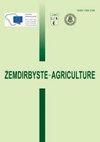紫花苜蓿种子和根瘤菌基液体接种剂在营养性Cambisol中的效果
IF 0.8
4区 农林科学
Q3 AGRICULTURE, MULTIDISCIPLINARY
引用次数: 1
摘要
在过去的几十年里,以泥炭为基础的生物接种剂已被证明是成功的苜蓿种子接种。但是,使用液体接种剂或预接种种子将大大方便苜蓿作为小种子豆科植物的播种。因此,本研究评估了四种液体制剂对Sinorhizobium (Ensifer) meliloti菌株218在长期储存期间存活的影响。海藻酸钠(SA)和聚乙烯吡罗烷酮(PVP)对S. meliloti菌株218的生长没有影响,但对其在液体生物接种剂中的存活有显著的积极影响,最长可达240天。通过试管试验和2年的田间试验,研究了种子预接种对苜蓿植株固氮效率的影响。现场试验于2018年和2019年在Eutric Cambisol中进行。与不预接种和添加矿质氮的对照处理相比,所有培养基预接种苜蓿种子的地上部干重和全氮含量均显著增加。在两年的栽培中,播前3个月用SA和PVP预接种种子的地上部总干重最高。此外,在第2年(2019年),这些处理的地上部干重与矿质氮处理相比显著增加。研究结果表明,含有SA和PVP的根瘤菌生物接种剂既可作为液体生物接种剂,也可用于苜蓿种子的预接种。本文章由计算机程序翻译,如有差异,请以英文原文为准。
Efficiency of alfalfa seed priming and rhizobial-based liquid inoculants in an Eutric Cambisol
In the last few decades, peat-based bioinoculants have been proven as successful in alfalfa (Medicago sativa L.) seeds inoculation. However, the use of liquid inoculants or pre-inoculated seeds will greatly facilitate the sowing of alfalfa as a small seed legume. Therefore, this study evaluated the effect of four liquid formulations on the survival of Sinorhizobium (Ensifer) meliloti strain 218 during long-term storage. Sodium-alginate (SA) and polyvinylpyrrolidone (PVP) did not affect the growth of S. meliloti strain 218 and showed a significant positive effect on its survival in liquid bioinoculants up to 240 days of storage. The effect of seeds pre-inoculation on the efficiency of nitrogen (N) fixation in alfalfa plants in test tube and a two-year field experiment was measured. The field experiment was conducted in 2018 and 2019 in an Eutric Cambisol. The dry weight of alfalfa shoots and total N content significantly increased in pre-inoculated seeds with all media, compared to the control treatments without pre-inoculation and adding mineral N. In both years of cultivation, the highest total shoot dry weight was achieved by seeds pre-inoculation with SA and PVP 3 months before sowing. Furthermore, in these treatments, shoot dry weight significantly increased compared to the treatment with mineral N in the 2nd (2019) year. The results of the research showed that rhizobial bioinoculants with SA and PVP could be used as liquid bioinoculants as well as for successful pre-inoculation of alfalfa seeds.
求助全文
通过发布文献求助,成功后即可免费获取论文全文。
去求助
来源期刊

Zemdirbyste-agriculture
AGRICULTURE, MULTIDISCIPLINARY-
CiteScore
1.80
自引率
11.10%
发文量
36
审稿时长
>12 weeks
期刊介绍:
Zemdirbyste-Agriculture is a quarterly scientific journal which covers a wide range of topics in the field of agricultural sciences, agronomy. It publishes articles of original research findings in the English language in the field of agronomy (soil and crop management, crop production, plant protection, plant breeding and genetics, biotechnology, plant nutrition, agrochemistry, soil science, microbiology etc.) and related areas. Articles are peer-reviewed. Review, debating papers as well as those of a methodological nature will also be considered.
 求助内容:
求助内容: 应助结果提醒方式:
应助结果提醒方式:


